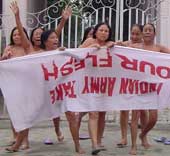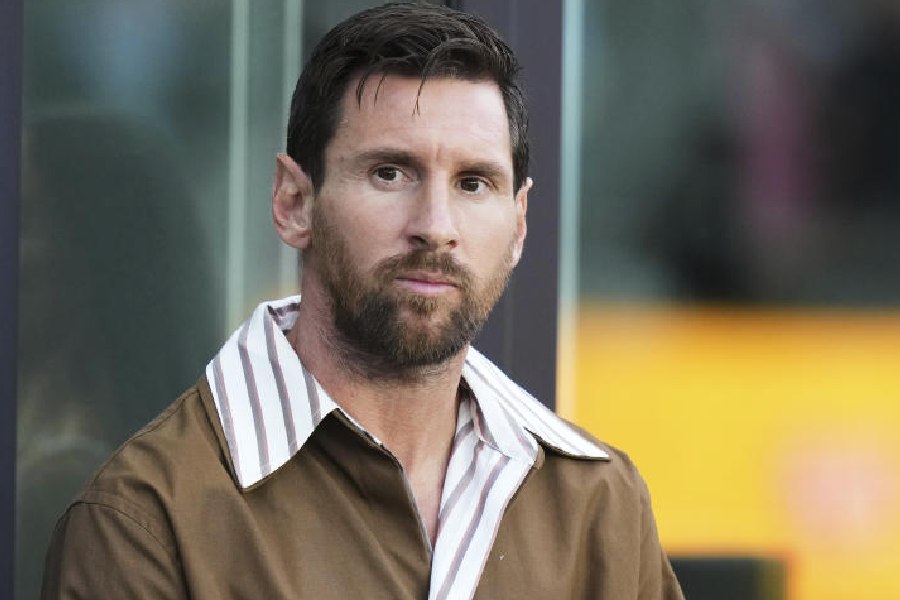|
|
| Making inquiries |
“The parents being given electric shocks,/ The children cry ‘amma’ ‘apa’, /So they are given electric shocks,/ They can’t cry ‘amma’ ‘apa’./ Tana-nee-na nee-na ta-na/ Nee-na tana tana nee-na,” sings the composer of this Tamil song, a startlingly thin 24-year-old, the only male survivor of a family in Oornatham village in Lakkampatty panchayat, some miles away from Mettur town in Tamil Nadu. The catchy folk-ballad describes the events that usually follow when Special Task Force men, engaged by the governments of Tamil Nadu and Karnataka to catch Veerappan, descend on any of the villages close to the hilly forests that are his domain, to arrest “informers” or “helpers” of the now legendary criminal.
In the universe of inhumanities, the condition of the prisoners in Abu Ghraib is slightly different from the villagers picked up by the STF in the name of Veerappan. Many of them “died” in custody, others were released after a few days or months and still others were incarcerated under the Terrorist and Disruptive Activities (Prevention) Act for years without trial. There has been no digital camera to tell their story to the world.
Murugeshan, the singer, was picked up as a youngster and released after a few days. He watched his father and uncle being beaten, being subjected to electric shocks, hung upside down and beaten on the soles, and being rolled flat by an iron roller. He had to watch, there was no escape from that if your closest kin were being “interrogated”. The two men were then shot, he did not see that. Murugeshan is reticent; the details come from his parents’ friend, who had been with them. Rama Naicker can only limp along on his stick, his hands and feet useless, his eyes blinded by sunlight, his voice barely audible. Murugeshan’s mother was released too, after going through the same routine. She is now “mental”, like many of her fellow survivors. She stood by as one woman narrated how, when the STF came, this woman’s husband said, “I cannot bear torture,” and killed himself. Murugeshan’s mother’s eyes look and don’t look, they don’t really connect, and it seems a further violation to expect her to speak.
The STF picked up the biggest haul of villagers in 1993, after Veerappan blew up 22 people, including policemen and forest officials. Since he cannot be caught — even though the Tamil Nadu government claimed that the task force had reduced his followers to three or four and policemen said they had been in “viewing distance” of him many times — the STF must show something for the more than Rs 100 crore that the two states have spent for his capture. The villagers need not always be picked up. They can be sent into the forest, allegedly to lead STF men to Veerappan, and then shot in the back in an “encounter”. Or they can be just beaten up, if they are buying more than two days’ provisions at a time, because the extra must be for Veerappan. Mani’s little brother was sleeping when the STF burst into the house. They beat him up. He is over 20 now, shuffles quietly along with his hands held stiffly in front and looks as though he might flee. He has grown up running frienziedly at the sight of a jeep or a uniform, or at the sound of a horn.
The usual pick-ups are the tribal people, who collect forest produce, and Veerappan’s kin and castemen. The Vanniyars are therefore most vulnerable, and among them, those of the sub-caste Arasupadachi, to which Veerappan belongs. Between 1993-94, many were released from custody, most maimed for life and many of the women without their men. Mathy’s husband had been taken. Those released seven months later told her that he had been set on fire. Since he refused to die, the STF had to poison him, they said. Sivagammy, of Naickerthanda village, heard after seven months of hopeful waiting that her husband had been shot nine days after being taken, that is, exactly nineteen days after their wedding.
But the stories stayed with the tellers for years, the terror was too great. It was not before 1995-97 that the tellers surfaced, helped by social work organizations that counselled them and gave them the courage to speak. In June, 1999, the National Human Rights Commission, in response to allegations of torture and harassment by STF personnel, constituted a panel headed by A.J. Sadashiva, a former judge of the Karnataka high court, to look into the complaints. The Sadashiva commission has submitted its report sometime back. It is mystifying that in a land where the press is free, the commission is so little heard of, and that its report remains unrevealed to the public.
There have been fewer arrests in recent times, although a fortyish man described his month-long custody as late as in 2000. They all talk about the electric shocks, pointing first of all to the earlobes and then to other parts of the body — the inside of the mouth, for example. This man, like other men, was blindfolded with his hands tied behind his back before the electric charge was released. He lost all sense of time. Most of the released men cannot work at all: it is not just pain, it is that their systems do not function any more.
But the STF are very much around. A stranger can go in only for social work. In every village, the quietness of the glowing sky, green fields and rows of coconut palms on the forested slopes is shattered within minutes by the sputtering of the inevitable motorbike, as STF men cruise past to find out who has come. The news reaches them in a flash, through informants among the villagers.
In one village, two of them came up to inquire. The questioner looked like a well-built young god, and he stood astride the threshold of another man’s house as if the place were his to kick aside. It was not enough for him to be told that the usual NGOs had come to check on the progress of self-help groups, a common programme in all the villages. Are you working only with torture victims? he asked. With everyone who is poor, was the answer. The self-help groups, which have become an important activity for the women, are deliberately composed of victims and non-victims, as one of the ways in which to reduce the victims’ sense of isolation.
The men and the older women talk about their experiences in some detail. In Periyathanda village, Thippy cannot begin her day without her ten tablets, the pain is terrible. She cannot see in the sun, cannot wet her hair or feet because that is agony, her “internal machinery”, like that of many others, has been shattered. Her husband has left her. Social workers took her to a specialist hospital which has prescribed another dose of controlled shocks. Thippy, who earlier tried to commit suicide, is now willing to go for the neurological treatment.
It is the returning spirit of the victims that makes them broadcast their experiences as the STF keeps touring the village. Thangamma insists on repeating at every public forum how many times a senior police officer had raped her during her three-and-a-half years in jail. No bribe will shut her up.
But the younger women are less open. Multiple rape, much of it in front of husbands, brothers and in-laws, and electric shocks in the vagina, do not encourage conversation. The adults in a large number of the 600 affected families are solely women, who can work only if they rest every other day.
In Mettupalaiyur village in Karungullur panchayat, old Chinapallai, her hands twisted out of shape by electric shocks and beatings, and her scarred legs barely managing to carry her, has lost her husband, four children, among them two sons, and a son-in-law. They have nothing, they say, they live because they have to. Her daughter, her body and mouth held together like a silent shrug, works in a field. Nor does Lakshmi feel like talking, as she settles her gaunt, thirty-plus body among the others gathered before her house in Chettipatty village in Kaveripuram panchayat. She and her husband were TADA detainees for nine years: when she came out, her husband and brother-in-law were dead. Perumai and her daughter were arrested under TADA. Perumai’s husband, her five sons-in-law and one grandson are all dead. Their smiles are polite and humourless, their eyes brilliant and blank. Muthulaxmi, whose husband has left her because she was raped so many times, turns away angrily to wipe the tears that will come in spite of herself.
“Even our memories don’t work right after the electric shocks, there are spells of blankness,” says Lakshmi. There are spells of blankness for an observer too. At certain moments the senses try to shut down completely, to stop registering faces and eyes, the stiffly held bodies, the hands. The mind wants to cower and hide.
In spite of the STF’s repeated efforts to stall gatherings, the NGOs managed to hold a large meeting in Martapalli on the border on March 18 to argue against the death penalty of the four remaining TADA prisoners. The court has postponed the execution. Medical camps have been foiled by STF efforts at the last minute, although one held sometime ago shocked the doctors who came. But even now, local doctors refuse to give victims written prescriptions. Torture should not be recognized by law-abiding citizens of the state, which is trying so hard to protect them from one dangerous criminal.
But some of the victims’ children are now being given aid to study. Many want to be lawyers: they want to fight human rights violations. The NGOs have trained a few victims as volunteers in the campaign, Murugeshan and Mani are volunteers. So is Murugan, lanky and fragile with childlike eyes, radiating a determination that makes Murugeshan say of the STF, “They are afraid of us now.”
Murugan was arrested with his family when he was 12. He and his father were in prison for eight years, where they drove nails into his feet. Reportedly the second youngest child in India to have been incarcerated, he shows where his feet still hurt to walk. His younger brother was released from custody, but not until electric shocks had been tried on the little boy to see what he could say about Veerappan.
It means a lot to them that they can now face the STF, that they can speak out to the world. They need legal, medical and psychological help, and livelihood options, all of which the NGOs are trying to address. But most of all, they are demanding that elusive and intractable thing called justice; monetary aid is not an answer.
They have all deposed before the Sadashiva commission, whatever it cost them, for one reason alone: what has happened to them should never happen to anyone else. If this means anything to the rest of the country, it is time to demand that the report of the commission be made public.












